Table of Contents
Over the last few weeks, countries around the world have slowly begun transitioning back into a more ‘normal’ way of life following the international COVID-19 quarantine. Although the public may feel more confident spending time outside, many changes that were incited during the stay-home period will begin to take permanent effect in our new normality.
For example, many major companies, like Twitter and Facebook are allowing employees to work from home permanently, adapting to the new way of life that was cultivated during the quarantine. These lasting changes also include how people purchase products, with many feeling more confident doing so online from within the confines of their own homes.
Large-scale transformations to buying habits call for brands to adapt to the eCommerce landscape to remain competitive and continue to convert a new kind of customer. One that is used to communicating with brands mostly online.
In this blogpost, we explore what the new normality means for brands and how they can leverage these changes within their eCommerce store.
Before we look into how brands can leverage eCommerce, it’s important to understand the current situation within our new normality. This includes looking at buyer confidence, digital technology and social media use, and the role of the retail store.
We know that consumer confidence has been severely damaged across the globe due to the unstable economy, and we can see that this is actually one of the variables that predicts future household spending.
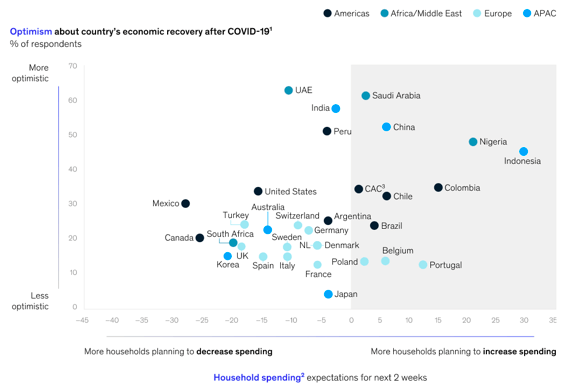
Source: McKinsey COVID Response Center
Weak household spending means a further delay to global economy recovery, as consumers will shop less and be choosier when they do. Meaning tougher competition for brands and a need to reach customers in the most effective ways possible.
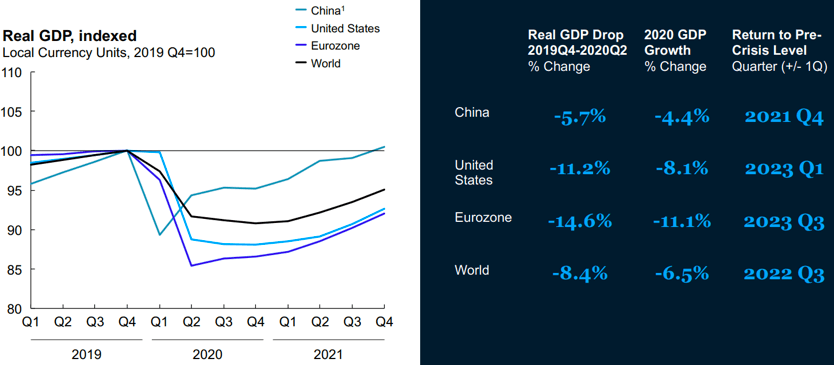
Source: McKinsey COVID Response Center
While overall spending will decline, the good news is that there will be an increased interest in casualwear, sportswear, home items and beauty products, at the expense of travel items, handbags and formalwear. We’ll also see consumers either making the move towards purchasing lower-priced goods or switching to premium brands that they may perceive as providing more value.
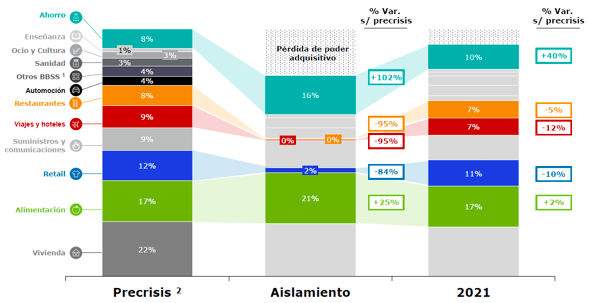
Source: Monitor Deloitte “Perspectivas sobre el comportamiento del consumidor”
As we enter the new normality, all of this will mean a few things for brands:
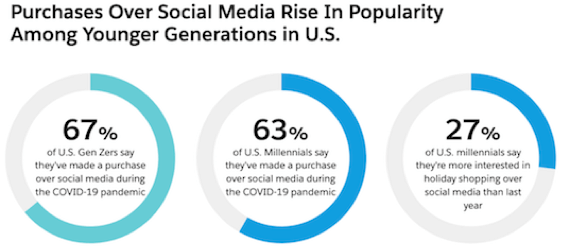
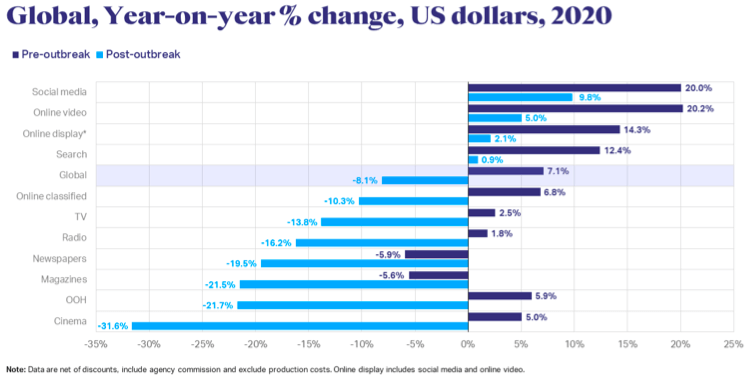
Source: “The real scale of the 2020 downturn” from WARC Blog
From this, it’s quite clear that we can expect a further acceleration in online shopping across geographies and age segments – more than ever. Therefore, brands will need to invest in more individualized forms of communication by providing shoppers with messaging that is more timely, relevant, and personalized via social media, as well as providing a truly intuitive, omni-channel shopping experience with fast and diverse ways of delivery.
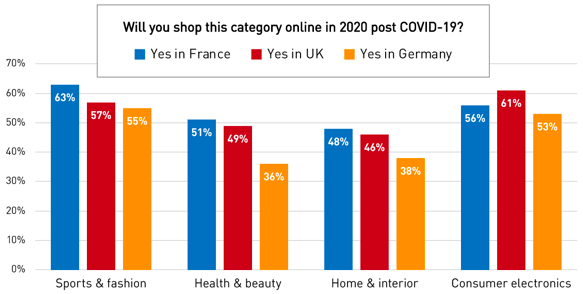
What we can understand from this analysis is that the work of eCommerce brands today is to turn this data into an intelligence that will help them build smarter online marketing strategies. And we’d like to help you with that.
With the current state of the new normality, brands should be putting more focus than ever on reaching customers where they spend time – online.
Based on the data, in order to acquire customers and remain competitive, brands will need to reinforce their online presences by…
Number one, two and three should always be high on the priority list – but are more the groundwork that brands should always be keeping in mind to succeed. Assuming that you’re already working to have those covered, we’d like to focus specifically on numbers four and five.
As the lines between eCommerce and social media continue to blur, it’s important to provide consistent and clear messaging between the two – especially as customers are increasingly shopping from home.
But the most important question is: what will this messaging be?
While answering this question relies heavily on your brand’s specific story and image, we can very easily see the best lens for sharing that brand messaging consistently through eCommerce and social. The answer lies within your customers.
The key to delivering a compelling customer experience while developing a strong social community – these crucial factors for success in the new normality – is something that you can get directly from your customers in the form of User Generated Content.
By collecting authentic content created by real customers on social media and integrating it into the online shopping experience, brands are able to successfully bridge the social media and eCommerce experience into one compelling online journey. This journey, which enables customers to shop customer content directly, not only increases engagement – but increases eCommerce sales.
In the case of Salsa Jeans, an online jeans brand, this meant a 17.27% increase in conversion rates thanks to their UGC integration with the Flowbox Visual Commerce platform.
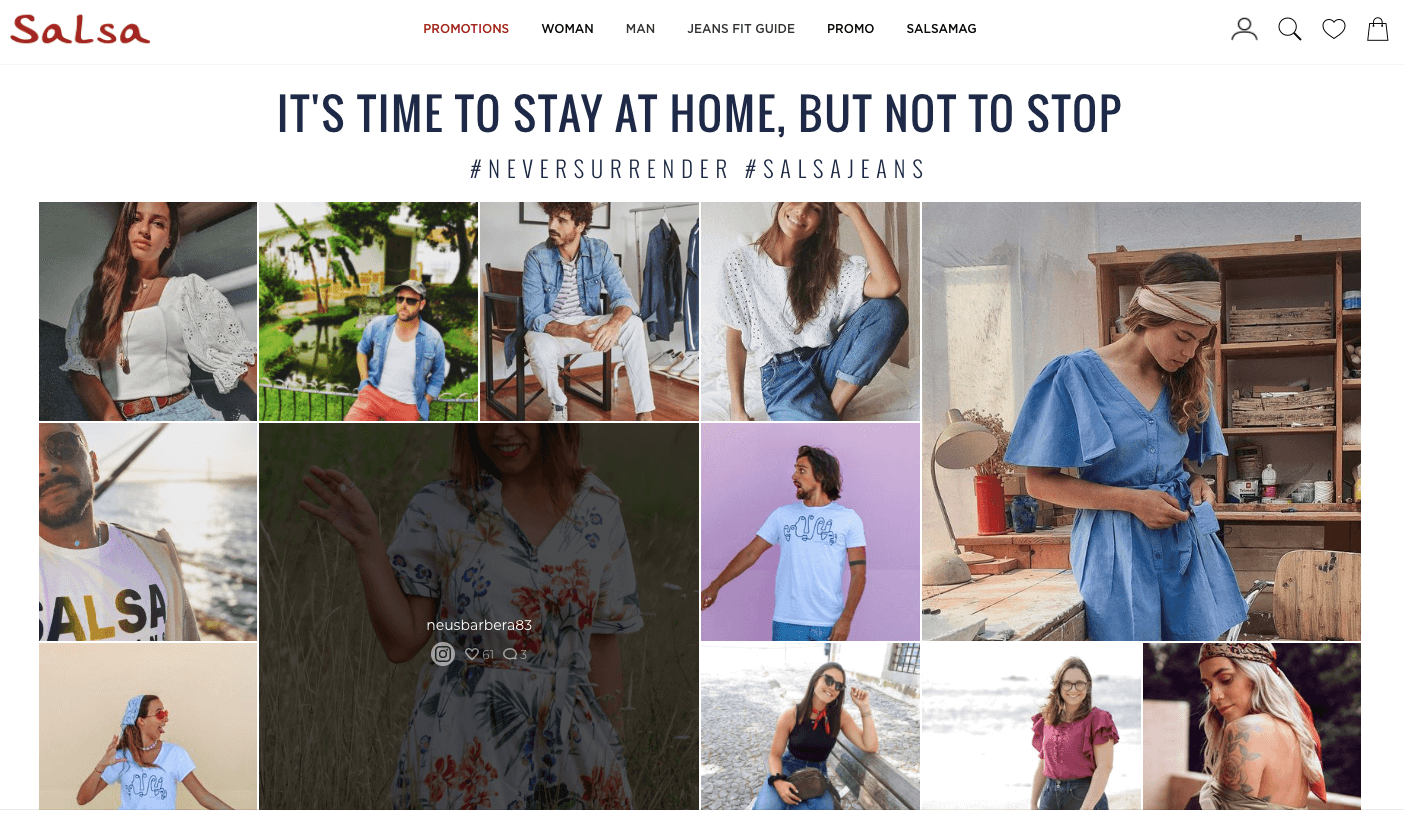
With messaging that directly speaks to the COVID-19 situation, they were able to continue engaging with customers through the quarantine and directly into the new normality.
With the drastic increase in social media use around the world, this strategy will help eCommerce brands leverage their customers’ time spent online by creating a compelling online shopping journey – from social scrolling, to your online store, to purchase.
This kind of integration can also help foster an online community, like gamer brand Newskill Gaming. Their authentic UGC integration helped them grow closer with their customers despite the pandemic, meaning that they’re ready to continue deepening these relationships as we enter into the new normal.
“Our online marketing strategy is focused on building a strong community. I thought that User Generated Content would add a lot of value and make it easier for the client to fulfill the buying process by seeing how the products look in real life. People appreciate the User Generated Content, and we are watching our customers evolve with this tool. I think we made a good call with this one!”
Gema Aliaga, Social Media & PR Manager at Newskill Gaming
Not only are they creating a stronger online community, they also increased their online conversion rates by 13.09% with UGC, demonstrating the potency of this strategy.
With it, you can address the three goals for entering the new normality: delivering a compelling experience, developing a social community online, and helping to build a customer-centric service.
As we transition into a new normal, confidently enter into this transformative buying landscape with the help of UGC. See what it would look like on your website by requesting a demo of the Flowbox platform.